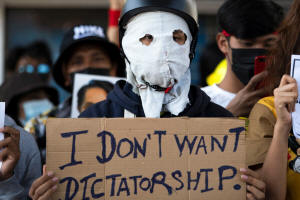Protests rock Myanmar for fifth day, West condemns security response
 Send a link to a friend
Send a link to a friend
 [February 10, 2021]
(Reuters) - Protesters took to the
streets of Myanmar for a fifth day on Wednesday, vowing to keep up
demonstrations against last week's military coup even after a woman was
shot and critically wounded during clashes the previous day. [February 10, 2021]
(Reuters) - Protesters took to the
streets of Myanmar for a fifth day on Wednesday, vowing to keep up
demonstrations against last week's military coup even after a woman was
shot and critically wounded during clashes the previous day.
The United States and United Nations condemned Tuesday's use of force
against the protesters who are demanding the reversal of the Feb. 1 coup
and the release of deposed leader Aung San Suu Kyi, and other leaders of
her National League for Democracy (NLD).
"We cannot stay quiet," youth leader Esther Ze Naw told Reuters. "If
there is blood shed during our peaceful protests, then there will be
more if we let them take over the country."
Thousands of people joined demonstrations in the main city of Yangon. In
the capital, Naypyitaw, hundreds of government workers marched in
support of a growing civil disobedience campaign.
A group of police in Kayah state in the east joined the protesters and
marched in uniform with a sign that said "We don't want dictatorship",
according to pictures published in media.

There were no reports of violence on Wednesday but soldiers took over a
clinic that had been treating wounded protesters in Naypyitaw on
Tuesday, a doctor there said.
Another doctor said a woman protester was expected to die from a gunshot
wound to the head sustained during a Tuesday confrontation with police
in Naypyitaw.
She was wounded when police fired, mostly into the air, to clear the
protesters. Three other people were being treated for wounds from
suspected rubber bullets, doctors said.
Protesters were also hurt in Mandalay and other cities, where security
forces used water cannon and arrested dozens.
Four policemen were injured on Tuesday as they tried to disperse
protesters, some of whom threw stones and bricks, the military said.
The military has imposed restrictions on gatherings and a night curfew
in the biggest cities.
'DISPROPORTIONATE'
The protests are the largest in Myanmar in more than a decade, reviving
memories of almost half a century of direct army rule and spasms of
bloody uprisings until the military began relinquishing some power in
2011.
The military justified its takeover on the grounds of fraud in a Nov. 8
election that Suu Kyi's NLD party won by a landslide, as expected. The
electoral commission dismissed the army's complaints.
Western countries have condemned the coup but taken little concrete
action to press for the restoration of democracy.
The U.S. State Department said it was reviewing assistance to Myanmar to
ensure those responsible for the coup faced "significant consequences".
"We repeat our calls for the military to relinquish power, restore
democratically elected government, release those detained and lift all
telecommunication restrictions and to refrain from violence," spokesman
Ned Price said in Washington.
[to top of second column]
|

A demonstrator holds a placard during a rally against the military
coup and to demand the release of elected leader Aung San Suu Kyi,
in Yangon, Myanmar, February 10, 2021. REUTERS/Stringer

The United Nations called on Myanmar's security forces to respect
people's right to protest peacefully.
"The use of disproportionate force against demonstrators is
unacceptable," Ola Almgren, the U.N. representative in Myanmar,
said.
Avinash Paliwal, a senior lecturer in international relations at
London University's School of Oriental and African Studies, said
Myanmar will not be as isolated now as it was in the past, with
China, India, Southeast Asian neighbours and Japan unlikely to cut
ties.
"The country is too important geo-strategically for that to happen.
The U.S. and other Western countries will put sanctions - but this
coup and its ramifications will be an Asian story, not a Western
one," Paliwal said.
'BRUTAL ACTION'
A doctor in Naypyitaw said the woman who was shot in the head was in
a critical condition and not expected to survive. Social media video
verified by Reuters showed her with other protesters some distance
from a row of riot police as a water cannon sprayed and several
shots could be heard.
The woman, wearing a motorcycle helmet, suddenly collapsed. Pictures
of her helmet showed what appeared to be a bullet hole.
"Now we see the military takes brutal action against us," said Htet
Shar Ko, an interpreter. "But we young people will keep fighting
against the regime under our motto - military dictatorship must
fail."
Alongside the protests, a civil disobedience movement has affected
hospitals, schools and government offices.
Veteran activist Min Ko Naing called in a Facebook post on all
government workers to join the disobedience campaign and for people
to take note of those who didn't.
Protesters are also seeking the abolition of a 2008 constitution
drawn up under military supervision that gave the generals a veto in
parliament and control of several ministries, and for a federal
system in ethnically diverse Myanmar.

Suu Kyi, 75, won the Nobel Peace Prize in 1991 for campaigning for
democracy and spent nearly 15 years under house arrest. She faces
charges of illegally importing six walkie-talkies and her lawyer
said he has not been allowed to see her.
Suu Kyi remains hugely popular at home despite damage to her
international reputation over the plight of the Muslim Rohingya
minority.
(Reporting by Reuters staff; Writing by Matthew Tostevin and Lincoln
Feast; Editing by Raju Gopalakrishnan, Robert Birsel)
[© 2021 Thomson Reuters. All rights
reserved.] Copyright 2021 Reuters. All rights reserved. This material may not be published,
broadcast, rewritten or redistributed.
Thompson Reuters is solely responsible for this content. |